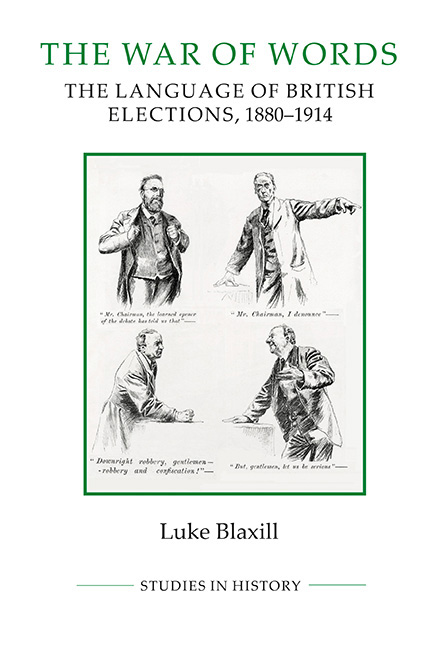Book contents
- Frontmatter
- Contents
- List of figures
- Acknowledgements
- Abbreviations
- Technical glossary
- Introduction : the challenge of reintegration in political history
- 1 On method : text-mining, corpora and the historical study of language
- 2 The impact of reform : the general elections of 1880 and 1885
- 3 The impact of home rule : the general elections of 1886 and 1892
- 4 The impact of imperialism : the general elections of 1895 and 1900
- 5 The impact of New Liberalism : the general elections of 1906 and 19101
- Conclusion: who won the war of words?
- Appendix 1 Technical and methodological
- Appendix 2 Statistical
- Bibliography
- Index
4 - The impact of imperialism : the general elections of 1895 and 1900
Published online by Cambridge University Press: 26 April 2020
- Frontmatter
- Contents
- List of figures
- Acknowledgements
- Abbreviations
- Technical glossary
- Introduction : the challenge of reintegration in political history
- 1 On method : text-mining, corpora and the historical study of language
- 2 The impact of reform : the general elections of 1880 and 1885
- 3 The impact of home rule : the general elections of 1886 and 1892
- 4 The impact of imperialism : the general elections of 1895 and 1900
- 5 The impact of New Liberalism : the general elections of 1906 and 19101
- Conclusion: who won the war of words?
- Appendix 1 Technical and methodological
- Appendix 2 Statistical
- Bibliography
- Index
Summary
Electoral politics, 1895–1900
In June 1895 Lord Rosebery was forced to resign after losing a Commons vote over the supply of cordite to the army, and Lord Salisbury, on taking over, immediately called a general election. The outgoing Liberal ministry had passed few measures of real significance, with the exception of the Parish Councils Act in 1894, and the introduction of death duties in Harcourt's budget of the same year. The party was still reeling from Gladstone's final retirement in 1894, and Rosebery had little to show to the electorate other than to re-present the Newcastle Programme, and blame the House of Lords for obstructing its implementation.The election represented the party's Victorian nadir, and they left 132 seats uncontested. On the opposite side, the Conservatives and the Liberal Unionists had moved closer together, and it was not a surprise that they gained ninety-eight seats and won a crushing Commons majority of 152.
East Anglia closely followed the national picture. The swing to Unionism from the previous election was just 1 per cent, but this yielded impressive gains. The retirement of J. J. Colman at Norwich allowed the local brewer Harry Bullard (who had served a seven-year ban following his unseating on a petition in 1885) to return as the city's junior member, and John Colomb gained Yarmouth. The Liberals wrested a seat back at Ipswich, but the successful candidate, Daniel Ford Goddard, was now their only East Anglian borough member. In the counties, the picture was unchanged in Norfolk, with the Liberals holding four out of six constituencies (albeit with small majorities in the Mid, East and Northern divisions), but in Suffolk they lost Stowmarket and Woodbridge to Ian Malcolm and Captain E. J. Pretyman respectively. They also left two difficult seats (Bury St Edmunds and Sudbury) uncontested: just the second time that they had failed to field a candidate for an East Anglian division since 1880. The campaign itself was not dominated by a single major issue, but the corpus suggests that the House of Lords, Local Veto and social reform were emphasised most widely, while the discursive significance of Home Rule declined markedly.
- Type
- Chapter
- Information
- The War of WordsThe Language of British Elections, 1880–1914, pp. 124 - 170Publisher: Boydell & BrewerPrint publication year: 2020



